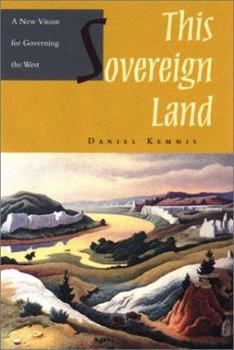This Sovereign Land: A New Vision for Governing the West
This work proposes that the management of public lands by the federal government of the USA is no longer working in the eastern part of the country. The author believes that the West should manage its... This description may be from another edition of this product.
Format:Hardcover
Language:English
ISBN:1559638427
ISBN13:9781559638425
Release Date:June 2001
Publisher:Island Press
Length:224 Pages
Weight:1.15 lbs.
Dimensions:0.9" x 6.2" x 9.3"
Related Subjects
Administrative Law Business & Investing Education & Reference Land Use Law Natural Resources Nature Nature & Ecology Political History Political Science Politics & Government Politics & Social Sciences Popular Economics Public Policy Regional Planning Social Sciences Textbooks Urban Planning & DevelopmentCustomer Reviews
1 rating
Western Public Lands Policy and Democracy
Published by Thriftbooks.com User , 22 years ago
Daniel Kemmis, the author of this thoughtful boook, is the director of the Center for the Rocky Mountain West at the University of Montana and formerly served as the mayor of Missoula Montana. He describes himself early in the book as a democrat with a capital "D". However he makes proposals for local control of management decisions on Forest Service and Bureau of Land Management Lands in the Western States that are ordinarily associated with Republican or conservative positions.The focus of the book is the "interior west" consisting of the states of Arizona, Colorado, Idaho,Montana, Nevada, New Mexico, Utah, Wyoming. These states are charcterized by rugged terrain, a lack of water, sparse population, an abundance of timber and extractive resources and a high percentage of Federally owned land. Kemmis argues that it is no longer good policy for these lands to be managed under the current confusing Federal statutory regime. He argues for collaboration among westerners and involved users to determine the best ways for the West to manage its lands.Much the best part of this book, for me, was the historical perspective Kemmis brings to his study. He writes perceptively and well about Thomas Jefferson and Theodore Rossevelt's important but conflicting visions about the American West. Jefferson, an expansionist in spite of himself, was fascinated with nature but viewd the West as a buffer for National security and as a component of his vision of an America consisting of small yeomen. Roosevelt too was an expansionist but saw the need of tight Federal control of the West and its resources to protect them for future generations. Current policy is an uneasy mix of Jeffersonian and Rooseveltian ideas.There is also a good, if brief, discussion of the Lincoln-Douglas debates and how the different visions of these two men played out over time on issues of local versus national control. I found it creative. Kemmis arguues that the West has attained a great deal of sopistication (maturation) since Theodore Roosevelt's days and should be allowed a greater voice in the management of its (the United States') resources. He maintains that the Federal govenment is increasingly distant from the concerns of the West, and that the current Federal management regime is inconsistent with basic Jeffersonian democracy -- the people managing the resources of concern to them and thus taking a greater control of their own lives. He argues that Federal statutes and administrative officials are almost uniformly well-intentioned but that the West is too caught in the politics of Washington D.C., resulting in dissatisfaction by those in the region regardless of their other political commitments.In advocating for "collaborationism", Kemmis is aware of the policy (and law) requring public participation in land use decisions. He argues that people are reluctant to collaborate when they know that decisionmakers in Washington D.C. will have the ultimate say over the managem






